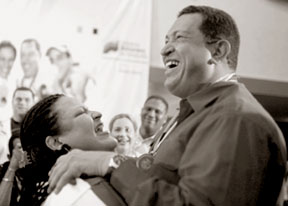|
observer |
|
|
|
|
|
OTHER LINKS |

|

|

|
Bolivia goes back to the whipIndian community justice is making a comeback under Bolivia's first indigenous president with the emphasis on the whip.
In Wilicala, a remote village in the Andean highland, a group of men were on their way to a meeting. As they walked through the market square I noticed some coloured ropes slung around their chests. The ropes were chicotes or whips and the men wearing them were mallkus - the word for prince or leader in the Aymara language. Francisco Espejo, an elderly man whose teeth were stained green from chewing coca leaves, was one of them. He said he was delighted that whipping is now an officially sanctioned punishment. It's much better to give someone a few lashes and be done with it * Francisco Espejo, village elder "When we had attorneys from the Western justice system, they put people behind bars for 20 years," he said. "Those with money bought good lawyers and didn't go to jail so what kind of justice was that? "It's much better to give someone a few lashes and be done with it." One of President Evo Morales's biggest campaign promises was to revolutionise the justice system. He vowed to promote pre-Columbian community-based courts in which village elders try wrongdoers and determine how they should be punished. This practice, which predates the Incas, has three main rules which are: Amu Sua - Don't Steal; Amu Llulla - Don't Lie, and Ama Quella - Don't Be Lazy.Most of the mallkus were reluctant to talk to outsiders. "When the Bolivian state was controlled by whites they used Western justice as a way of subordinating the Indians and the memory of that is still strong in some parts. "That is why some people are still afraid to talk about these things." But under President Morales the underground is going mainstream. There is a new department devoted to Indian law inside the justice ministry and the law faculty of San Andres University in La Paz recently started a three-year community justice course for people from indigenous backgrounds. The recently appointed head of Bolivia's penal system, Ramiros Llanos, says the old Indian methods are the best way to handle small crimes like the theft of some cattle in a village. Overcrowding in prisons, he adds, has reduced them to "human garbage tips". The new justice minister, Casimira Rodriguez, says the lynchings were not about community justice but rather a total absence of justice in a country which spends just 1% of its national budget on its judiciary. BBC |








